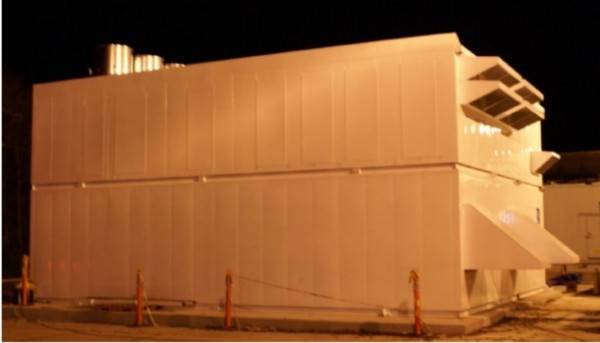Some of our ReadWriteWeb staff in Oregon may have noticed their lights slightly dimmer this morning than yesterday. Okay, we’re kidding. Amazon’s has thrown the switch on its second set of Western U.S. cloud computing clusters, alleviating some of the burden on its large and growing cache of customers in Silicon Valley.

The new Oregon cluster is Amazon’s latest, fully operational example of its incredible cloud-in-a-box – quite literally a set of refurbished shipping containers retrofitted with compact cooling equipment.
Amazon premiered this design, which it calls Perdix, in a presentation to reporters last June. There, the company’s distinguished engineer, James Hamilton, showed estimates that the power cost for managing a typical cloud data center like any one of Amazon’s worldwide, runs about $11 million per megawatt/hour per year. Some 18% of that cost applies simply to cooling the data center. Meanwhile, about 11% of the power that the data center purchases from its electric provider is lost in the distribution process along the power grid.

So Hamilton demonstrated that much of the expenditure for lost power could be recouped not by building sleek, glass-chandelier-encased data centers on prime real estate, but by instead by forklifting a half-dozen ugly, beige boxes onto a vacant lot in some small town like Umatilla, Oregon.
Prices for some Amazon Web Services will be about 10% lower for the new Oregon region than for the other public U.S. regions. Prices for Elastic Computing Cloud (EC2) services are the same for Oregon as for Virginia, except quadruple-extra-large instances for compute and GPU layers are not yet available from the Oregon cluster. A large Windows-based on-demand instance runs $0.48 per hour for Oregon and Virginia, $0.52 per hour for Northern California. A large instance of Amazon’s Relational Database Service (RDS) runs $0.44 per hour for both Oregon and Virginia, $0.48 per hour for Northern California.
But for Elastic MapReduce, which spins up an Hadoop instance inside EC2, prices for a large on-demand instance are identical across the board, at $0.06 per hour, although again, quadruple-large instances are not available from the Oregon cluster.
















